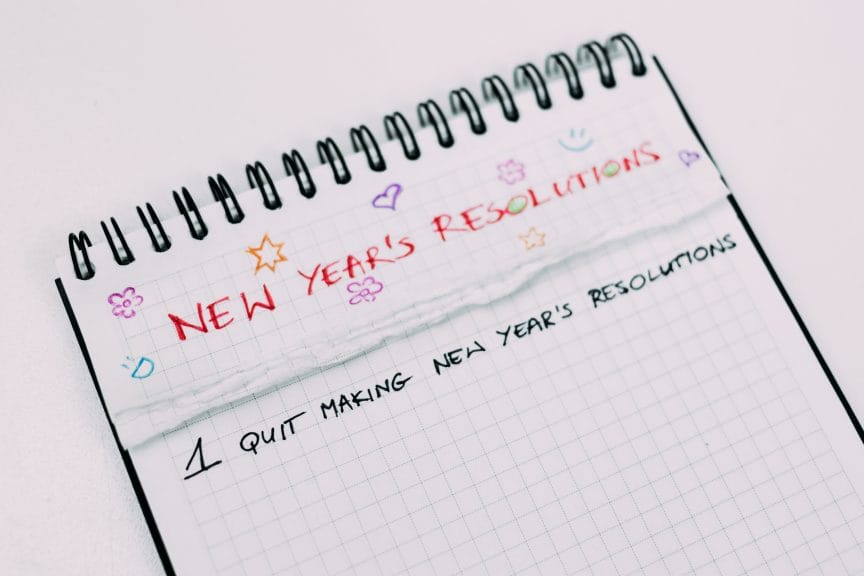New Year’s resolutions – we’ve all made one. Everybody has an idea of how they want to enrich their life and become the “best version” of themselves. However, the best resolution may actually be to have no resolution at all.
The tradition of making New Year’s resolutions goes back approximately 4,000 years. This is when the ancient Babylonians made the first resolutions. The resolutions have adapted over time, but they are still very popular among people across the globe. People may want to pick up a new hobby or quit a bad habit. Generally, they involve a sudden, big change, which unfortunately, just isn’t that easy.
The Problem with New Year’s Resolutions
Human behavior is deep-rooted within ourselves. In order to change it, it has to be done for a long period of time. This usually isn’t the case when making a resolution.
Many people make their resolutions because they feel obligated – it is a tradition, after all. People often go to social media or their friends to share their plans for the New Year, which can cause others to jump on the bandwagon and make their own. A recent study from Forbes Health stated that “62% [of people surveyed] say they feel pressured to set a New Year’s resolution.”
When people do this out of pressure or obligation, their resolutions are often impulsive and unrealistic. For example, let’s say someone asks what your resolution is and you haven’t really thought of one. You may decide on the spot “Well, I could always lose some weight,” which is one of the most common New Year’s resolutions.

Credit: Pexels/Andres Ayrton
When people set a resolution like that, they’re acting impulsively by not truly thinking about what they would like to change. They’re only thinking about things they think they should change. In doing this, they’re focusing on the negative.
Furthermore, actually losing weight is a task that requires time, dedication, and planning. One should have a plan on when and how they’re going to exercise, if and how they’re going to change their diet, and much more. This example can apply to other activities, like quitting drinking or spending less money. They all require planning. The resolution also has to be something they truly want to do for themselves. This will encourage them to stay motivated to pursue it.
Unfortunately, this is usually not the case. Instead, people go into the New Year with a flimsy resolution and expect immediate results from something they didn’t fully plan out or even want. When this happens, people quit, and the negative effects of setting a New Year’s resolution begin.
The Negative Effects of Setting a Resolution
According to Forbes Health, “the average resolution lasts just 3.74 months.”
Ultimately, the majority of people quit their resolutions or fail to reach them by the end of the year. This can cause people to feel like they are lazy or a failure. In turn, this has a negative impact on someone’s self-esteem overall, as well as their general mental health.

One study published by the National Library of Medicine explained how “failure to make progress toward personal goals can lead to negative affective states, such as depression and anxiety.”
With most people quitting their goals by March, they are spending a significant part of the year in these negative affective states, which seems counterintuitive. Why set a resolution to better yourself when it’ll just make you feel worse in the long run?
Not only may the outcome of the resolution have a negative impact, but pursuing the resolution may as well.
In an interview with WYKC, Dr. Susan Anders explained:
“Often, when we make significant or extreme behavior changes, that adds a lot of pressure and stress. That raises our cortisol level.”

Cortisol is our body’s main stress hormone. When we are more stressed out, that level increases and affects all of our body systems. According to the American Psychological Association, stress causes headaches due to muscle tension, brings on panic attacks, increases your risk for heart disease and affects your mood.
Is the stress of a New Year’s resolution really worth it if it’s likely you won’t reach your goal anyway?
In my opinion, no. This is why the best resolution to have is no resolution at all. There is no need to be pressured into making a resolution that will negatively affect you in the long run.
However, if you feel confident that you can achieve your goal, go for it!
If You Must…
Obviously, poorly planned resolutions can fail, but there are always people who succeed as well. Here are some reasons why:
1. They set realistic goals
As I explained, a big reason why people fail to achieve their goals is because they don’t make a plan before January 1st about how to actually accomplish it.
According to the Journal of Consulting and Clinical Psychology, “setting goals with concrete plans can significantly improve your behavior and transform your habits.”

So, if you must make a New Year’s resolution, make sure to have a thorough plan made ahead of time.
2. They are doing it with good intentions
Another way to increase your chances of accomplishing your goal is to make it approach-oriented rather than avoidance-oriented.
Approach-oriented goals are positive and focus on gaining something, whereas avoidance-oriented goals are negative and focus on avoiding something.
A study published by the National Library of Medicine explained that people with approach-oriented goals are “significantly more successful than those with avoidance-oriented goals.”
For example, let’s say I want my goal to be about saving money. An approach-oriented goal will say, “I will try to save x amount per week.” An avoidance-oriented goal will say, “I will try to avoid spending x amount per week.” The avoidance-oriented goal is more likely to leave you stressed, which will, in turn, have a negative effect on your overall well-being.
3. They set numerous small goals, working toward a larger goal
Lastly, setting multiple smaller goals rather than one large goal going into the New Year will increase your chances of success. It sounds a lot less daunting to save $50 per week than $2,600 per year. It is easier for people to accomplish their larger goal by making gradual progress toward it over the course of the year.
So, if you must make a New Year’s resolution, make sure to set smaller goals to work toward a larger goal.
Looking Forward
Obviously there are both pros and cons for the case of setting a New Year’s resolution. However, based on the negative effects setting one could have, I’d say the best resolution is not to have one at all! Don’t immediately stress yourself out going into 2024.

If you still feel like next year is the time for a change, just make sure you go about setting a resolution the right way based on the tips listed above. Here are some ideas if you do choose to set a New Year’s resolution.
Cheers to 2024!













